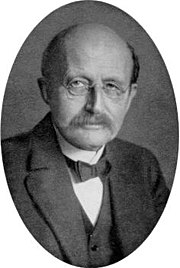Max Planck
Appearance
| Max Planck | |
|---|---|
 | |
| Ìbí | Oṣù Kẹrin 23, 1858 Kiel, Holstein |
| Aláìsí | October 4, 1947 (ọmọ ọdún 89) Göttingen, West Germany |
| Ọmọ orílẹ̀-èdè | German |
| Pápá | Physics |
| Ilé-ẹ̀kọ́ | University of Kiel University of Berlin University of Göttingen Kaiser-Wilhelm-Gesellschaft |
| Ibi ẹ̀kọ́ | Ludwig-Maximilians-Universität München |
| Doctoral advisor | Alexander von Brill |
| Doctoral students | Gustav Ludwig Hertz Erich Kretschmann Walther Meißner Walter Schottky Max von Laue Max Abraham Moritz Schlick Walther Bothe Julius Edgar Lilienfeld |
| Ó gbajúmọ̀ fún | Planck's constant Planck postulate Planck's law of black body radiation |
| Àwọn ẹ̀bùn àyẹ́sí | Nobel Prize in Physics (1918) |
| Religious stance | Lutheran[1] |
| Signature | |
Notes He is the father of Erwin Planck who was executed in 1945 by the Gestapo for his part in the July 20 plot. | |
Max Planck (April 23, 1858 – October 4, 1947) je onimosayensi ara ile Germany.

|
Àyọkà yìí tàbí apá rẹ̀ únfẹ́ àtúnṣe sí. Ẹ le fẹ̀ jù báyìí lọ tàbí kí ẹ ṣàtúnṣe rẹ̀ lọ́nà tí yíò mu kúnrẹ́rẹ́. Ẹ ran Wikipedia lọ́wọ́ láti fẹ̀ẹ́ jù báyìí lọ. |
Itokasi
[àtúnṣe | àtúnṣe àmìọ̀rọ̀]- ↑ The dilemmas of an upright man: Max Planck and the fortunes of German science. J. L. Heilbron. Harvard University Press, 2000. ISBN 0674004396. p.183.
